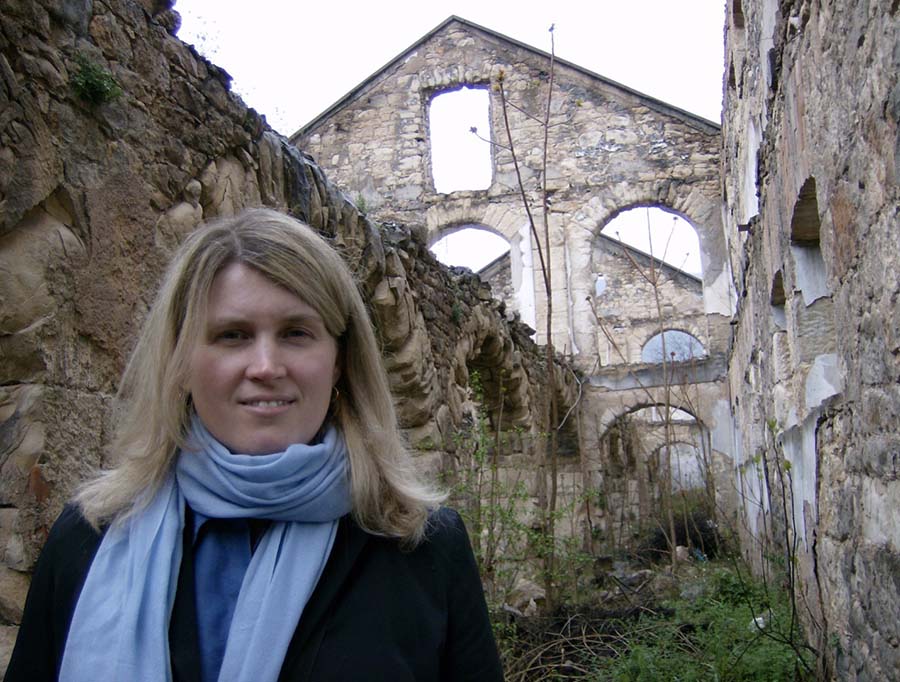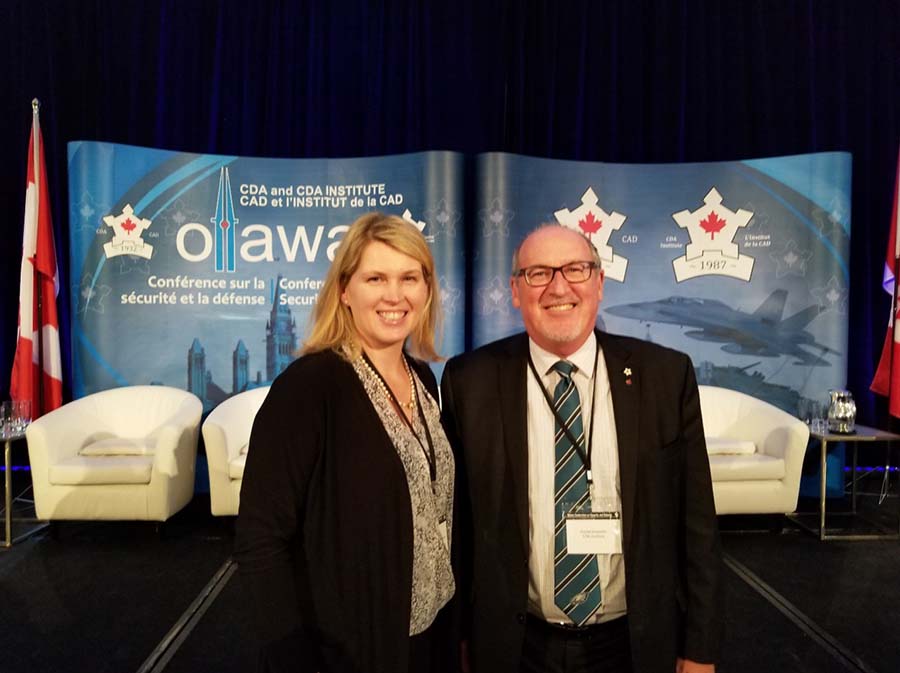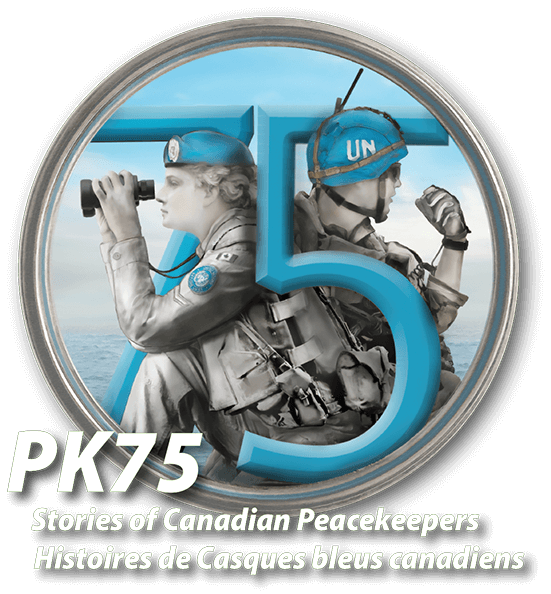What we Teach or How we Think? Reflecting on Peacekeeping and Peace Operations
I have never served on a peacekeeping mission, so why does my reflection on peacekeeping matter? Since 1996, I have served my country in a civilian way, training and educating military learners to contribute to global peace and security in an ever-increasing complex environment of conflict and calamity.
This is my personal reflection as an educator of military learners — both Canadian and international — about shifting away from what we teach about peacekeeping to how we think about peace and security.

Sarah is pictured here at the destroyed Mostar University campus during a 2008 research trip. Her research, funded by the Pearson Peacekeeping Centre, focused on local impressions about peacekeeping, stabilization, and reconstruction of Mostar and Sarajevo, two of the major cities destroyed during sieges in the former Yugoslavia between 1991–1993 and where Canadian peacekeepers served during and after the conflicts. Source: Meharg, 2008.
In 1996, I was 24 years old and fresh out of the University of Guelph with a professional degree in Landscape Architecture. My application to become an intern at the Pearson Peacekeeping Centre (PPC) in Cornwallis, NS was accepted, and I arrived there knowing nothing about peacekeeping. I was a creative sort and sought to apply my education to territory-based peace negotiations because armed conflict occurs in places, and I had deep knowledge about the importance of places to people. The other interns and staff, I learned, had Master’s degrees in political science, international relations, and security studies. Uh-oh. I had to prove myself in an environment in which some of my civilian peers ridiculed my education and my value to the organization.
The PPC hosted one-week, two-week, and six-week courses. In those days, the Department of Defence had formal agreements to (re)train militaries of former Warsaw Pact countries. This was accomplished in a series of different programs and ways, and one of them was the PPC. Courses had participants from these countries, from African nations, as well as from what we now refer to as the ‘five-eyes’. The interns had a similar national make-up, and this world-class program was made up of young professionals from Canada, Britain, United States, France, Kenya, Germany, and Ghana, among many others. After the daily grind of classroom studies — this is before the PPC adopted a learning-by-doing education philosophy in 2003 — the course participants, staff, and interns organized ourselves into soccer teams that we called ‘Canada vs The World’. All the other national representatives would pit themselves against the Canadians in these all-out soccer matches on the pitch in front of the Officer’s Mess at the former CFB Cornwallis. Suffice it to say, Canada always lost, and it was always in good fun. We’d then convene at the Officer’s Mess for a post-game drink, culminating in dinner, where friendships and conversation took hold and lasted beyond the end of each course. Concerns for geopolitics, differences in command, the utility of peacekeeping and the United Nations, and emerging security threats became common ground, rather than contentious divisions.
Under the mentorship and tutelage of the PPC’s founders Lt-Colonel Alex Morrison (Retired) and Brigadier-General Don MacNamara (Retired), I became aware of Canada’s identity as a peacekeeping nation and the professional ethical responsibility of military trainers and educators. I learned to bring value to the organization and to be confident in my education that had prepared me to understand military culture, identity, and human behaviour.
What I came to realize in 1996, and then between 2003–2009 as the PPCs Senior Researcher, was that peacekeeping and peace operations outcomes at the strategic, operational and tactical levels, are fundamentally based on human behaviour. It appeared that military training and education had less to do with political science degrees, or the ability to discern liberalism from realism, but the keen observation of human behaviour as a lynchpin for success in the field. Further, to train and educate in a certain way emancipated the military learner from preconceived ways of thinking, and allowed for exploration and creativity in their approach to security. In this case, the PPC was the perfect environment for national representatives to listen, learn, and forge new ideas about the nature of conflict and how they thought about peacekeeping, peace operations, and wider peace and security.
As I matured and delved into my own Masters degree in War Studies, followed by a Ph.D. in Cultural Geography with a focus on post-war reconstruction, I observed some of the successes and failures of Canada’s expeditionary missions relying on the quality and depth of the relationships between States, between organizations, between government departments, between Armed Forces, between local stakeholders, and between military actors. Mountains could be moved and peaceful outcomes bolstered when friendships forged in training programs like those at the PPC allowed a person to pick up the phone or have a meeting to communicate interests. It was extraordinary to see human relationships save the day, or the absence of them result in brittle, short-term success for war-affected populations around the world.
In 2005, I embarked on the journey of university educator, teaching at the Royal Military College in Kingston and later at the Canadian Forces College in Toronto. I developed graduate level courses on peacekeeping and peace operations, and complex operations. I moved away from training and focused on educating officers. I was exposed to the thinking of young cadets at the beginning of their careers, as well as the thinking styles of mature officers groomed for command.

Sarah is pictured here with her colleague, MGen Daniel Gosselin (Ret'd), former Chair of the Board of Directors of the CDA Institute and Senior Mentor, National Security Program at the Canadian Forces College. From 2018-2022, Meharg worked closely with the mentors and professors at the College to advance reflective thinking opportunities within professional military education. Source: Meharg, 2019.
What really caught my attention was observing how military actors adapted to new and complex thinking challenges in the classroom. As Canada’s military grows away from traditional peacekeeping operations, to counter-insurgency operations, and humanitarian and disaster response operations, this has significantly expanded the list of topics that military personnel are required to learn about. The list is too long for the training and education time available. Successfully responding to changing operations requires not only deep operational knowledge, but also intellectual flexibility to think differently about the operating environment. What shall we teach our military learners when there is not enough time available to cover all the topics?
Since 2016, I have sought to better understand not only what is being taught to Canada’s military officers but, more significantly, how we teach military learners. As a civilian military educator, how can I, in fact, help military learners be better at peace operations? And, how can I prepare military learners to face the most daunting security challenges of our time? I’ve been approached by students in the Joint Command and Staff Program and the National Security Program who have worked to shift how they think. Some have lauded the techniques and strategies to adopt more open and reflective approaches to learning about the complex emerging security environment in which they must lead. Some students are excited about learning how to think differently, while others discuss how painful and uncomfortable the process is. Others comment on how fundamental the relationship between educator and military learner was to enable openness and curiosity in the classroom.
As I observed in my early days at the PPC, human behaviour — especially our relationships with one another — is fundamental to educational outcomes, including how military learners think about operations.
Perhaps the days of peacekeeping training are behind us — along with the remnants of Canada’s peacekeeping identity — but what remains are adaptable and smart military learners able to think differently about resolving conflicts and creating secure environments. I know from personal experience that they are ready for the challenge. As a military educator, I need to meet learners where they are at, and enhance the educator-learner relationship by developing a classroom that emancipates thinking. Because, resolving conflict and shaping the environment for sustainable peace and security is based on human relationships. It is by trusting one another that, together, we will meet the challenges of this ever-increasing complex environment of conflict and calamity.
I want to thank the thousands of military learners that I have had the privilege of working with since 1996. Your dedication to peace and security has made a difference to Canada and to local populations around the world.
Dr. Sarah Jane Meharg is a leading authority on social, cultural and economic reconstruction after war and natural disaster. A recipient of the Top Women in Defence award in 2020, Sarah is a military educator, researcher, and consultant frequently called upon by the Department of National Defence to assist the Forces on issues related to identity, culture, and economic reconstruction in conflict environments such as Afghanistan, Mali, Haiti, Iraq, and the Balkans. Sarah is currently working at the Dallaire Centre of Excellence for Peace & Security as an Engagements Officer and co-Editor of their new book Evolving Human Security : Frameworks and Considerations for Canada's Military.


